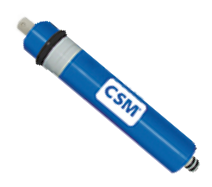CSM RE-1812 Series Residential
Reverse Osmosis (RO) Membranes

replacement reverse osmosis membrane elements for home drinking water systems
The performance of reverse osmosis (RO) drinking water systems is directly related to the quality of the RO membrane installed in the system. CSM RE-1812 series reverse osmosis (RO) membranes are both economical and effective, made by one of the top names in the industry.
These thin-film composite (TFC) membranes have a minimum salt rejection rate of 96% (98% expected) based on a 200 mg/l(ppm) NaCl solution at 60 psi applied pressure and 15% recovery.
- very econmical, brand-name membrane
- far higher rejection rates, greater durability and life as compared to cellulose (CTA) membranes
- high pH range tolerance
- shipped dry for convenient handling and long shelf-life
- NSF/ANSI Standard 58 listed
- best price guarantee
CSM RE1812 Series residential RO membrane elements fit most standard nominal 2-inch I.D. pressure vessels. Accordingly, they will fit in most residential RO membrane housings, regardless of brand! Be sure to match capacities, not just physical size to ensure proper performance. Compare measurements below to confirm.
| CSM RE1812 Series RO Membrane Specifications | ||||||
|---|---|---|---|---|---|---|
| Model | Membrane Type | Dia x Length | Test Pressure | Rejection Rate | ||
| RE1812 Series | Polyamide Thin-Film Composite (TFC) |
1.8 x 12" | 60 psi | 98%** | ||
* Capacity (permeate flow) and salt rejection based on the following test conditions: 200 ppm softened tap water, 77F (25C), 15% recovery and the specified applied pressure. Capacity for individual elements may vary.
** Minimum salt rejection is 96.0%.
Dimensions - Inches (mm)
| A 0.67 (17) |
B 0.9 (22) |
C 11.7 (298) |
D 0.9 (22) |
E 1.8 (45) |

| Recommended Operating Conditions: | |
|---|---|
| Maximum Operating Temperature: | 113F (45C) |
| Maximum Operating Pressure: | 150 psi (10 bar) |
| pH Range, Continuous Operation: | 2-11* |
| Maximum Feed Silt Density Index (SDI): | 5 |
| Free Chlorine Tolerance: | < 0.1 ppm** |
|
*Maximum temperature for continuous operation above pH 10 is 95F (35C). **Under certain conditions, the presence of free chlorine and other oxidizing agents will cause premature membrane failure. Since oxidation damage is not covered under warranty, we recommend removing residual free chlorine by pretreatment prior to membrane exposure. Most RO systems have carbon pre-filters for this purpose. |
Important note about selecting the correct membrane capacity: All RO systems use a drain line flow restrictor to create pressure against the RO membrane. This pressure is critical to the performance of the RO system. If the drain line flow restrictor is not correctly matched to the capacity rating of the membrane, problems such as slow or ceased water production or high water waste can result. Select a replacement membrane that matches the capacity rating of your existing membrane and system. If you want to upgrade to a higher capacity membrane to increase the rate and quantity of daily water production, it is critical that you upgrade both the membrane AND the drain line flow restictor. Contact us for assistance.
Notice: The use of this product in and of itself does not necessarily guarantee the removal of cysts and pathogens from water. Effective cyst and pathogen reduction is dependent on the complete system design and on the operation and maintenance of the system.
 Best price guarantee on all CSM RE-1812 Series membranes! If you find a lower advertised price, we will beat it by 5% of the difference - just call toll free 1-866-376-2690 - we won't be undersold! |
||||||
| Model | Dia x Length | Test Pressure | Capacity (GPD)* | Rejection Rate** | Price Each | |
|---|---|---|---|---|---|---|
| CSM-RE1812-25 | 1.8 x 12" | 60 psi | 25 | 98% | ||
| CSM-RE1812-35 | 1.8 x 12" | 60 psi | 35 | 98% | ||
| CSM-RE1812-50 | 1.8 x 12" | 60 psi | 50 | 98% | ||
| CSM-RE1812-60 | 1.8 x 12" | 60 psi | 60 | 98% | ||
| CSM-RE1812-80 | 1.8 x 12" | 60 psi | 80 | 98% | ||
Notice: The use of this product in and of itself does not necessarily guarantee the removal of cysts and pathogens from water. Effective cyst and pathogen reduction is dependent on the complete system design and on the operation and maintenance of the system.




